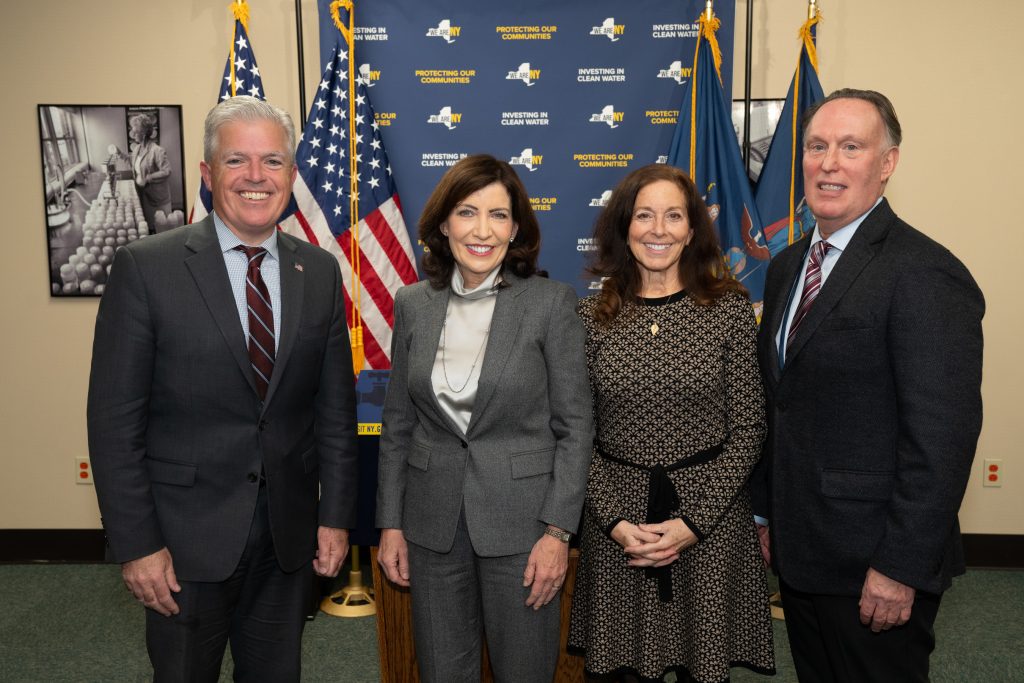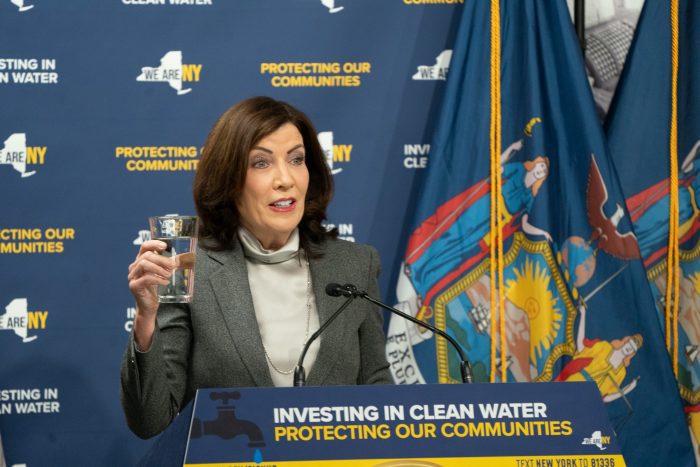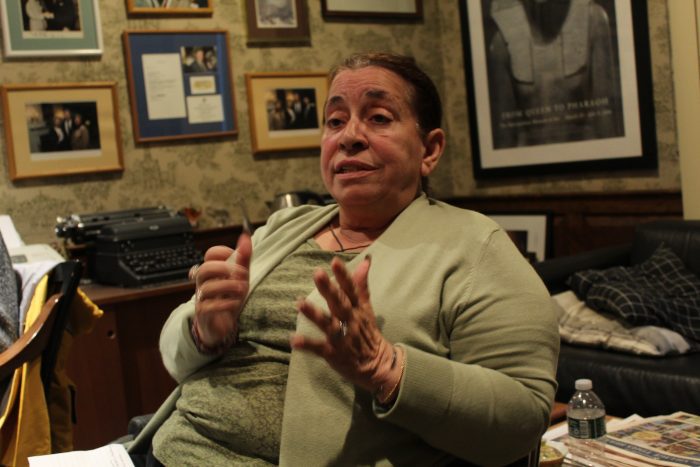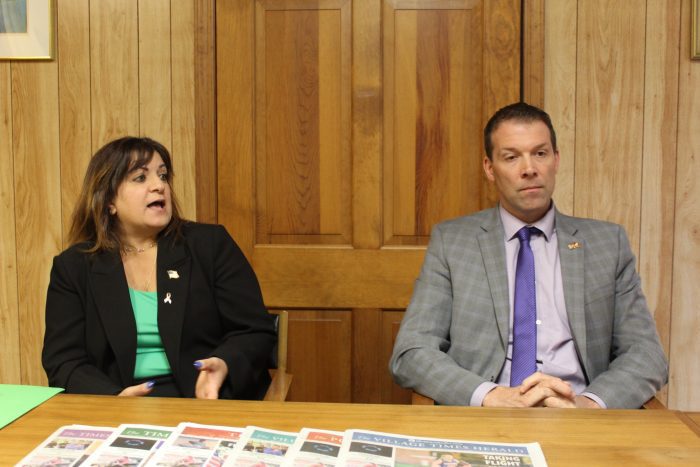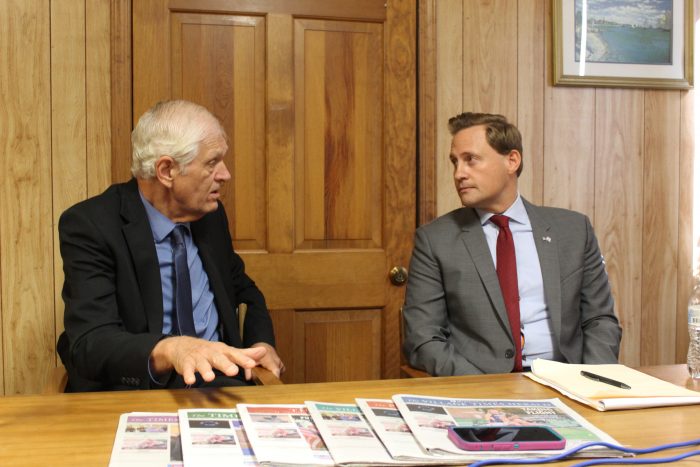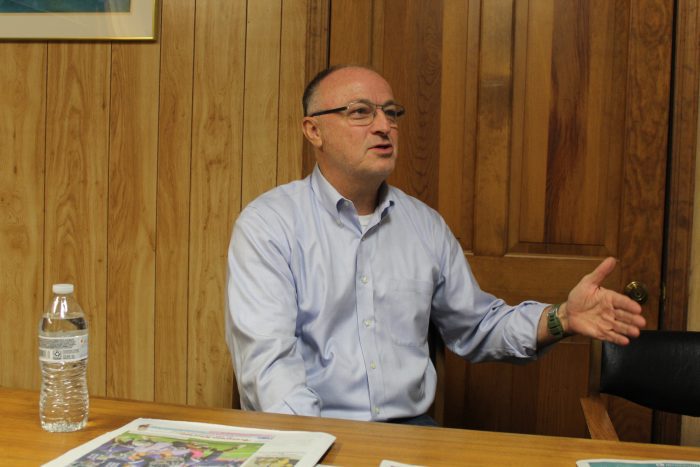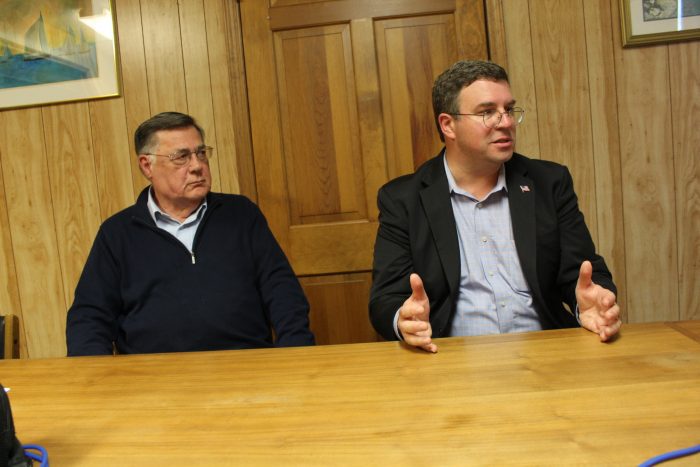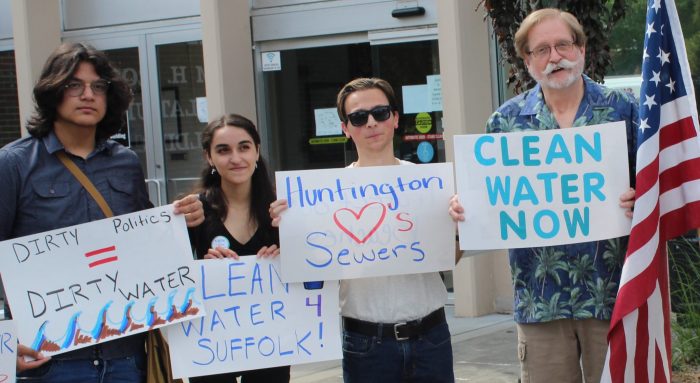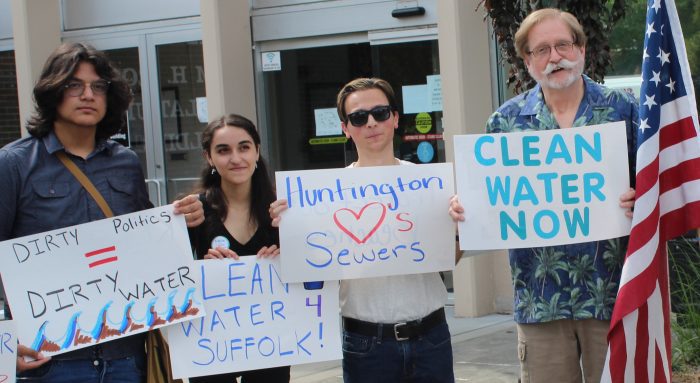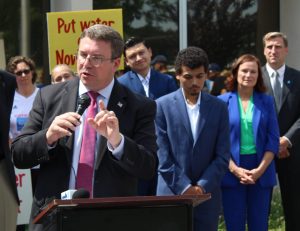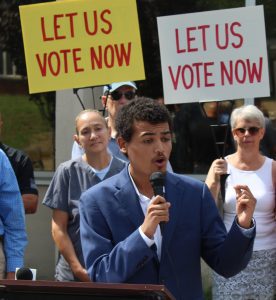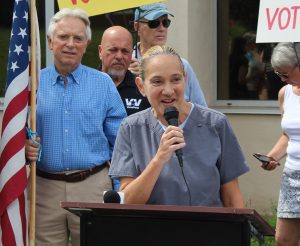This year marks the first open contest for Suffolk County’s top post since 2009 when three-term incumbent County Executive Steve Bellone (D) first won the job.
Bellone cannot seek reelection due to 12-year term limits for county offices. In his place, Town of Brookhaven Supervisor Ed Romaine (R) is opposing businessman Dave Calone (D).
At the TBR News Media office, the two candidates debated for roughly an hour and a half. Their conversation covered an array of policy matters from wastewater, municipal solid waste, public safety, budgets, homelessness and transit.
Introductions
Calone is a Setauket resident who said he is running because “we need people with new backgrounds and different skill sets as county executive.”
The Democratic candidate is a former state and federal prosecutor whose private-sector experience entails assisting startup companies and working with owners to help build their businesses.
Romaine is a Center Moriches resident who said he is running because he views the county government as headed down the wrong path. He served two terms in the county Legislature before serving five terms as Suffolk County clerk. He then reentered the Legislature before assuming the position of town supervisor via special election in 2012.
In his 38th year in public office, he contended that “experience is needed now more than ever, and I think you have to be able to start a job from day one.”
Issues
Identifying the issues motivating his campaign, Romaine cited budgets, administrative vacancies, public safety concerns and outdated infrastructure. He said he supported the federal $1.2 trillion Bipartisan Infrastructure Law and New York State’s $4.2 billion Environmental Bond Act, although infrastructure investments into Suffolk have lagged.
“We need someone that is going to be an advocate for Long Island to try to get that money because we need to rebuild our infrastructure,” he said. “Getting sewers, clean water — these are major issues that have to be dealt with.”
Calone said the voters he canvassed expressed great interest and concern over affordability, coupled with a lack of affordable housing options.
He proposed appointing a chief housing officer within the county government to coordinate with towns and villages, advocating for repurposing malls and strip plazas to address the county’s housing needs.
“Let’s identify housing priorities across the county, and then let’s say to developers, ‘This is the place to do it,’” Calone said, supporting streamlining of the permitting process and cutting red tape. He also emphasized public safety, affordability, well-paying jobs and the environment as other motivating factors.
Wastewater
This year’s election cycle is taking place concurrently with a countywide debate over the future of the region’s wastewater infrastructure. Over the summer, the Republican-led county Legislature blocked a 1/8-penny sales tax for wastewater investments from reaching the November ballot in the form of a referendum. If passed, the measure would have helped finance new wastewater investments.
Calone said he disagreed with the Legislature’s action. “What I would do as county executive is put that back before the Legislature,” he said. “If we need to tweak it in some way, I’m open to that.”
“The most important thing is that we have something we can put before the voters … that they can vote on because right now we are behind other places in going after” federal and state subsidies, he added.
Romaine condemned the process through which the current administration pursued instituting the sales tax, saying the correct approach would have been the county Legislature passing a Home Rule Message rather than including language through the state budget.
He also objected to the revenue split between IA, or Innovative/Alternative, septic systems and new sewer infrastructure. “To say that this bill is perfect, it’s not,” he said. “I want to see sewers because we have more densely populated areas in this county that do not have sewers and need sewers,” adding, expanding sewer access “would do more to clean our waters.”
Garbage
The planned closure of the Brookhaven Town landfill — which services the entire region — places uncertainty over the long-term future of the county’s waste management system.
Romaine said averting an islandwide garbage crisis would require a regional approach to garbage disposal.
“We need to get the 31 villages and the 10 towns on the same page, working with the county and maybe even Nassau County to create a regional approach to solid waste,” he stated.
To facilitate a regional program, he supported transporting garbage by rail. “Since it can’t be buried here, can’t be maintained here, can’t be kept here, it has to leave the Island,” Romaine added. “The best way to do that is by rail.”
Calone pointed to the Brookhaven landfill as a failure by Brookhaven Town. He said the county government must roll out a more comprehensive recycling and composting program with the goal of achieving zero waste, though this ideal is likely unattainable.
Given that the county will inevitably produce some waste in the years ahead, Calone endorsed the proposal to ship the remaining garbage by rail. “There’s going to be some waste left,” he maintained, “and it will need to be railed off of Long Island.”
Public safety
To combat crime within Suffolk County, Calone called for a fully-funded, fully-staffed Suffolk County Police Department.
“We need to make sure law enforcement has the technology and tools they need,” the Democratic candidate said. “We need to make sure that every school has a school safety plan and has school safety officers that are well trained — there’s no minimum training requirement for school safety officers.”
He also advocated for targeting drugs and drug trafficking into the county with more aggressive prosecutions while “taking guns out of the hands of dangerous criminals.”
Romaine centered his public safety priorities around vacancies within the police department, pointing to 51 unfilled detective slots.
“That’s also true for patrol officers, that’s true for superior officers, that’s definitely true corrections officers, it’s true for deputy sheriffs, and it’s true for a whole host and character of law enforcement,” the Republican candidate said.
Budgets
With long-term economic uncertainty and growing concerns over the county’s finances, Romaine said he would seek to achieve a AAA bond rating for the county government, pledging to apply the fiscal strategies from Brookhaven’s budget process.
“What we did is we began to pay off debt and reduce debt with any budget surpluses that we had,” the current town supervisor said. “We have, despite inflation, been able to put together structurally balanced budgets. We have been able to reduce our fiscal stress to nothing, our environmental stress to nothing.” He added, “I would do the same” for the county.
Calone highlighted the pending closure of the municipal landfill as deeply problematic for Romaine’s constituents, suggesting budgetary mismanagement by his opponent.
The businessman referred to the county government’s current financial state as “the best financial situation it has ever been in.”
With substantial reserves, Calone offered to return some surplus money to county taxpayers through a 10% general fund property tax cut.
“I want to look at the Suffolk County budget, one with an eye toward giving some of that money back to taxpayers, and two looking at it with a businessperson’s eye.”
Rebutting Calone, Romaine said that as revenue from the landfill gradually goes away, the town will install solar panels around the landfill complex and advance related alternative energy projects to recover the lost funds. “We have sufficient revenue for the town,” he said.
Responding, Calone noted that regardless of the recovered funds, a significant budget shortfall would likely befall the Brookhaven budget, triggering a sizable tax increase for town residents in the coming years.
Homelessness
In recent years, the county has observed a rise in homelessness, with many homeless individuals turning away from the shelter system.
Calone said the county government lacks adequate personnel within its Department of Social Services, with current staff inadequately paid.
He said addiction and mental health issues tend to be the primary drivers of homelessness and that the county is not tapping into various granting opportunities to address these problems.
“I propose having a county grants office,” he said. “We don’t have one now, and there’s no coordinated way of going after grants,” noting, “This is a way to tap into federal and state funding that we’re not getting right now when it comes to mental health, veterans issues and things like that.”
Romaine agreed that grant writing remains a deficiency within the county government and that social service workers deserve better pay.
He said the best explanation he has seen on homelessness came from a recent CBS “60 Minutes” interview by California Gov. Gavin Newsom (D), who is pursuing a new model for curtailing homelessness within the Golden State.
Newsom is “not of my party, but I’ve never heard somebody speak as well as he did on that issue,” Romaine said. “It impressed me. I’ve done some research on it, and I have some people working on it. If I have the good fortune to be elected, we’re going to take a look at it.”
Transit and trails
Officials have cited high costs associated with maintaining the county’s bus system as barriers to system expansion and modernization. To better serve the needs of riders, Romaine said modernizing the bus system begins with focusing on rails.
“We need to electrify our rail,” he said. But, he added, “None of our county buses meet the trains. You would think that you would want to create a synergy between trains and buses.”
Calone proposed reimagining the disparate modes of transit as “an integrated system.” He considered the current ridership within the county’s bus system as “ridiculously low,” arguing that empty buses give residents a sense that their government doesn’t work.
“We need to move away, I believe, from a fixed-route system everywhere except the far western part of the county,” he said. “As we move further east, we need to move toward more of an on-demand system” that uses smaller buses and modern technology to boost ridership and enhance the rider experience.
Along with traditional mass transit options, the county’s 2020 Hike-Bike Master Plan calls for expanding active-use recreation as an alternative form of transportation. To implement the ideas within the plan, Romaine supported connecting trails as part of an “overall transportation system.”
“I’d love to provide viable alternatives so that people don’t have to use a car-based system,” he said. He added that conserving open space would help expand nature trails.
Calone regarded the master plan as a “great plan” with many gaps to fill in.
He said the county must work with private landowners to acquire the lands to connect existing greenways and expand its linear park network.
“We need to have blueways [water trails] as well, where people can boat and kayak,” he said. “We’re going to put this sewer and septic program in place and, over these next bunch of years, are going to improve our water quality, and we’re going to make that available.”
He continued, “We pay a lot of money to live here, and we should enjoy what makes this place so special.”
Suffolk voters will pick one of these candidates to be their next county executive on Tuesday, Nov. 7.
